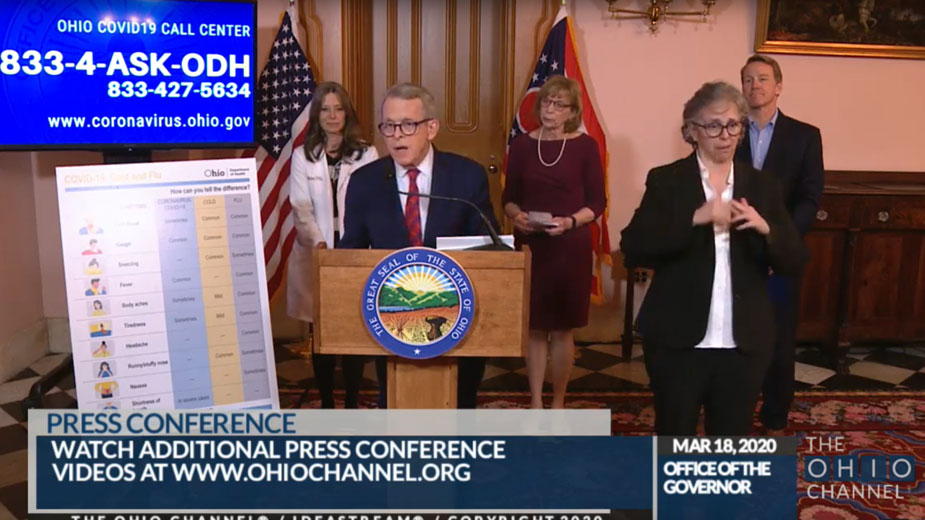State Orders 181 BMVs Closed, Hair and Nail Salons
YOUNGSTOWN, Ohio — Gov. Mike DeWine took additional steps Wednesday to help curb the spread of COVID-19 in the state, including the closure of 181 Ohio Bureau of Motors Vehicles Deputy Registrars.
At the close of business Wednesday, all of the BMV locations will close, except for five to remain open to continue issuing and renewal services of commercial driver’s licenses. All other services will be conducted online or by mail, or paused altogether, DeWine said during his daily press conference.
“Our transportation system is important,” DeWine said. “We have to keep moving the food. We have to keep moving the medical supplies.”
With more than 1 million individuals going to BMVs monthly, leaving them open would create another opportunity for the virus to spread, he said. Additionally, 52 driving exam stations will close.
DeWine says he will ask the general assembly to pass legislation to grant a grace period for individuals who cannot renew their license as a result of the closure. He is also asking all state law enforcement, including the Ohio State Highway Patrol, to not issue tickets for drivers who have an expired license because they couldn’t renew it.
Other businesses ordered closed at the end of business Wednesday include barber shops, beauty salons, spas and tattoo parlors.
Retailers, manufacturers, service providers, nonprofit organizations and other businesses that remain open are asked “beginning immediately to take the temperature of every single employee every single day before they come to work,” DeWine said. While not perfect, temperature checks are “one way to screen individuals out of the employees who come in” so they don’t infect others if they’re carrying the coronavirus, he said.
“Please check them. Please make sure that you’re complying with what I’m saying today,” DeWine said. “It’s so important for their safety.”
He’s also asked businesses to be “very aggressive” in cleaning and disinfecting surfaces, while making water, soap and hand sanitizer available for employees.
“These are things that businesses can do and they can do immediately,” he said. “Many are already doing this.”
The state isn’t taking these and other steps without first discussing it with representatives of impacted industries, said Lt. Gov. Jon Husted. The administration has daily phone calls with business and industry leaders in food service, manufacturing, real estate and even apartment building owners, he said.
During a call Wednesday with banks and credit unions, “they wanted me to provide some assurance,” he said.
“Don’t panic. You’re finances are safe,” Husted said. “These institutions are not going to be closed.”
If the physical location isn’t open, drive-thrus, ATMs and online services will still be accessible, he said.
DeWine says libraries are not being mandated to close, and “we’re going to leave this up to each individual county, each individual library” to decide, he said. He urges libraries to deliver as many services as possible without bringing people together.
Down the road, the National Guard may be called upon to help erect tents outside of hospital emergency rooms, and food banks have also requested assistance from the state, he noted.
As of Wednesday afternoon, the Ohio Department of Health reports 88 confirmed cases in the state, including three in Mahoning County.
On Tuesday, the Mahoning County Public Health confirmed the first two positive diagnoses of COVID-19: one male who is hospitalize and another male who is isolated at home. A third case was confirmed Wednesday. Officials said they were working to identify how those patients contracted the virus.
Of the 88 confirmed cases in the state, 26 have been hospitalized, reported Dr. Amy Acton, director of the Ohio Department of Health. Acton says the youngest to be hospitalized is 2 years old, and the eldest is 91, with a median age of 48. Of the confirmed cases, 33 are female and 55 are male, she said.
There are “zero deaths that we’re aware of at this time,” Acton said during Wednesday’s press conference.
Acton tried to quell concerns over limited capacity for tests by saying “80% of us will be fine,” and that individuals should treat the coronavirus like “a very bad flu.” Because officials believe there is already “widespread public transmission” of the virus, residents “have to assume it’s amongst us and it’s probably been here,” she says. As such, if the state allocates all resources such as test kits and personal protective equipment, or PPE, based on the number of cases, “we will miss the mark,” she said.
“We may never know fully who was exposed during this time,” she said. “Right now, we’re going to limit our resources and our testing to those who are in our hospitals.”
Even a negative test doesn’t necessarily indicate that the individual isn’t carrying COVID-19, she added, as it might be too early in the infection for the test to accurately diagnose. So, if an individual thinks they may be displaying symptoms of the virus, Acton advises them to stay home and treat it with over-the-counter medications for flu and colds.
“Most of us will ride that out,” she said.
She also advised anyone living in the house with the individual stay home. And if symptoms worsen, such as experiencing difficulty breathing, Acton says to contact one’s health care provider. If the individual doesn’t have a doctor and is experiencing breathing difficulties, he should “call the emergency room and let them know you’re coming” because the symptoms have worsened, she said.
Taking these precautions is important for the state’s supply chain, Husted said. “You have to take the precautions in the workplace to make sure there isn’t community spread in the workplace,” he said.
This week, the state received 78,000 requests for unemployment, up from some 6,500 two weeks ago, he said. Ohio has filed for designation as a disaster state, which should open up some opportunities for businesses to get relief, he said.
Copyright 2024 The Business Journal, Youngstown, Ohio.



